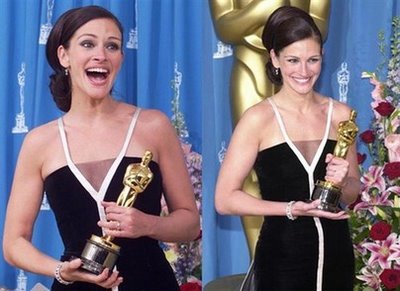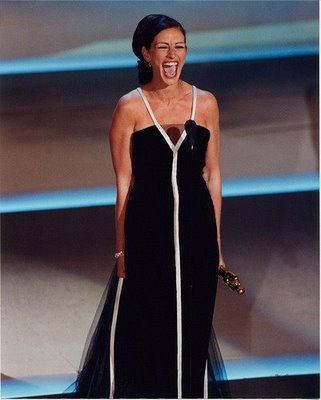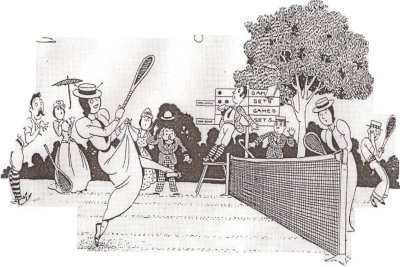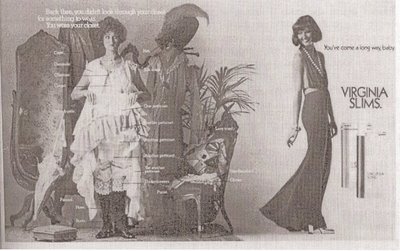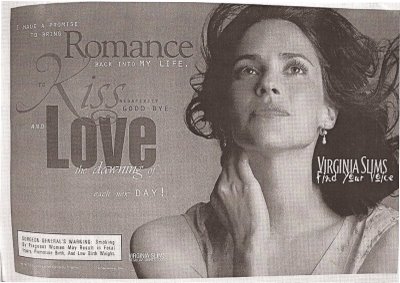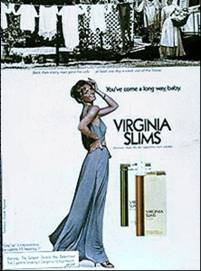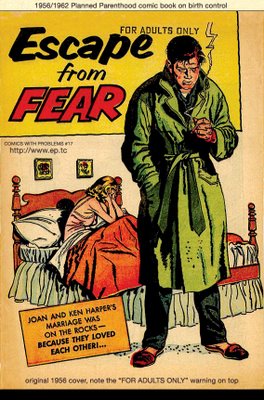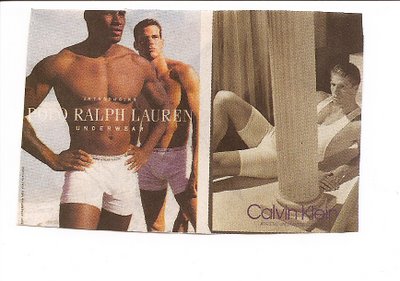This is Julia Roberts winning the Oscar for best actress. It was 2001. Notice that, despite the fact that she won for her portrayal of a very highly sexualized woman, she isn’t a stick figure. In fact, relative to the twigs of today, she is actually kind of thick and has pretty big arms. Could a woman could go to the Oscars looking like this today and not get called fat in the tabloids?
history
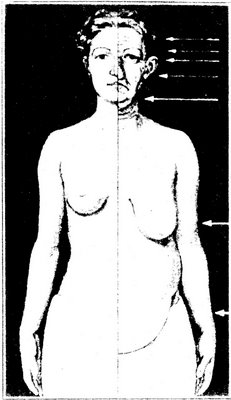 The caption to the photo said, “New York plastic surgeon Jacob Sarnoff drew this vision of total transformation–entitled ‘diagrammatic illustration of common deformities amenable to plastic surgery’–in 1936.”
The caption to the photo said, “New York plastic surgeon Jacob Sarnoff drew this vision of total transformation–entitled ‘diagrammatic illustration of common deformities amenable to plastic surgery’–in 1936.”
I found this in Venus Envy: A History of Cosmetic Surgery, by Elizabeth Haiken (1997), page 13.
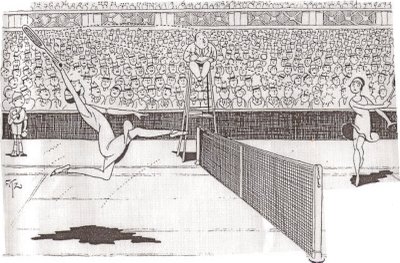
These two images were used in a 1927 ad for Wimbledon. Lisa actually sent them to me a couple of years ago but has never posted them, so I’m doing it. The point of showing the two images next to each other was to stress how liberated women were by 1927–they aren’t wearing stuffy old dresses to play tennis, and men aren’t shocked by the sight of a leg.
I use these, along with some of the “You’ve Come a Long Way, Baby” Virginia Slims ads, to show how “women’s liberation” is used by advertisers to sell products, as well as to imply that “now” (whenever “now” is) is always better than “then” (some indeterminate point in the past) and that the struggle for equality and freedom is over.
The 30-second (or so) videos below have been interspersed with MTV’s regular programming as part of Black History Month. MTV got Cornel West to be their superstar academic and expert on the Black American experience. The videos serve as the occasion for some interesting questions:
First, how do we evaluate the use of Black musicians, actors, and personalities by MTV? Is “representation” enough? Or does contemporary representation look uncomfortably like the representation of the past? (If you haven’t seen it, watch Spike Lee’s Bamboozled.)
Second, what does it mean that Cornel West signed on with MTV with what is, in effect, a mutual endorsement? Do we approve of Cornel West using his significant influence and importance in this way? Is this good from a reformist perspective? Problematic from a radical perspective? Did he “sell out”?
Third, how effective are these spots? I know little about the audience of MTV, but I imagine there are a lot of people who do not know who Cornel West is and are not inclined to offer him immediate respect. Cornel is idiosyncratic. Does your average MTV viewer see a gap-toothed, afro-wearing guy with odd mannerisms called “Professor” (which, we know, could mean anything) as authoritative? Or a buffoon?
Further, what do we think of the spots themselves? Is their content helpful? Do they teach us anything? Do we like what they teach us? Or is it just more empty lip-service to Black Americans?
Watch and tell us what you think:
[vimeo]https://vimeo.com/63979709[/vimeo]
[vimeo]https://vimeo.com/63979813[/vimeo]
Thanks to Richard for the heads up on this one.
Lisa Wade, PhD is an Associate Professor at Tulane University. She is the author of American Hookup, a book about college sexual culture; a textbook about gender; and a forthcoming introductory text: Terrible Magnificent Sociology. You can follow her on Twitter and Instagram.
Text: “Back then, you didn’t look through your closet for something to wear. You wore your closet. You’ve come a long way, baby.”
Find your voice with Virginia Slims.
This is a Virginia Slims ad from 1978. The picture above is of a woman hanging laundry out to dry and the text says, “Back then, every man gave his wife at least one day a week out of the house. You’ve come a long way, baby.”
I’m using this when I talk about the commodification of the women’s movement and how freedom has been turned into something you buy. I also like the vague “back then,” used to make now seem so much better in every way.
The image below is the cover of a comic book designed to teach adults about birth control (it seems to have been published in 1956 and again in 1962). Find it all online here.
Found here via copyranter.
 The caption to the photo said, “New York plastic surgeon Jacob Sarnoff drew this vision of total transformation–entitled ‘diagrammatic illustration of common deformities amenable to plastic surgery’–in 1936.”
The caption to the photo said, “New York plastic surgeon Jacob Sarnoff drew this vision of total transformation–entitled ‘diagrammatic illustration of common deformities amenable to plastic surgery’–in 1936.”
I found this in Venus Envy: A History of Cosmetic Surgery, by Elizabeth Haiken (1997), page 13.

These two images were used in a 1927 ad for Wimbledon. Lisa actually sent them to me a couple of years ago but has never posted them, so I’m doing it. The point of showing the two images next to each other was to stress how liberated women were by 1927–they aren’t wearing stuffy old dresses to play tennis, and men aren’t shocked by the sight of a leg.
I use these, along with some of the “You’ve Come a Long Way, Baby” Virginia Slims ads, to show how “women’s liberation” is used by advertisers to sell products, as well as to imply that “now” (whenever “now” is) is always better than “then” (some indeterminate point in the past) and that the struggle for equality and freedom is over.
The 30-second (or so) videos below have been interspersed with MTV’s regular programming as part of Black History Month. MTV got Cornel West to be their superstar academic and expert on the Black American experience. The videos serve as the occasion for some interesting questions:
First, how do we evaluate the use of Black musicians, actors, and personalities by MTV? Is “representation” enough? Or does contemporary representation look uncomfortably like the representation of the past? (If you haven’t seen it, watch Spike Lee’s Bamboozled.)
Second, what does it mean that Cornel West signed on with MTV with what is, in effect, a mutual endorsement? Do we approve of Cornel West using his significant influence and importance in this way? Is this good from a reformist perspective? Problematic from a radical perspective? Did he “sell out”?
Third, how effective are these spots? I know little about the audience of MTV, but I imagine there are a lot of people who do not know who Cornel West is and are not inclined to offer him immediate respect. Cornel is idiosyncratic. Does your average MTV viewer see a gap-toothed, afro-wearing guy with odd mannerisms called “Professor” (which, we know, could mean anything) as authoritative? Or a buffoon?
Further, what do we think of the spots themselves? Is their content helpful? Do they teach us anything? Do we like what they teach us? Or is it just more empty lip-service to Black Americans?
Watch and tell us what you think:
[vimeo]https://vimeo.com/63979709[/vimeo]
[vimeo]https://vimeo.com/63979813[/vimeo]
Thanks to Richard for the heads up on this one.
Lisa Wade, PhD is an Associate Professor at Tulane University. She is the author of American Hookup, a book about college sexual culture; a textbook about gender; and a forthcoming introductory text: Terrible Magnificent Sociology. You can follow her on Twitter and Instagram.
Text: “Back then, you didn’t look through your closet for something to wear. You wore your closet. You’ve come a long way, baby.”
The image below is the cover of a comic book designed to teach adults about birth control (it seems to have been published in 1956 and again in 1962). Find it all online here.
Found here via copyranter.

